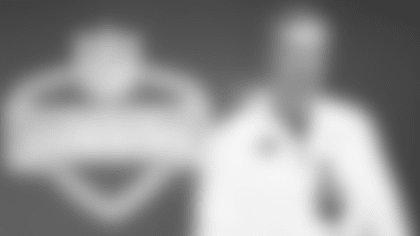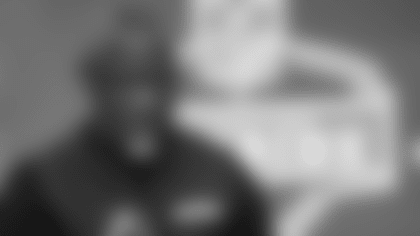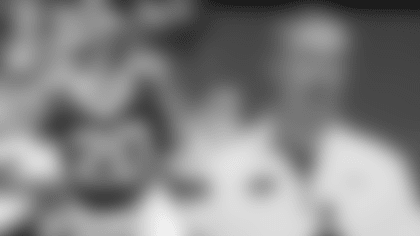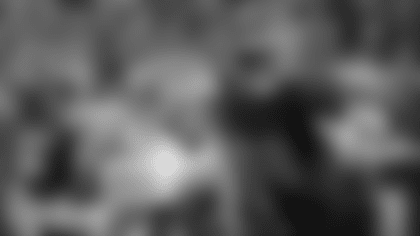Transcript of head coach Eric Mangini's news conference with the New York Jets media before Wednesday's practice:
We signed Abram Elam, a safety, we put Chansi Stuckey on IR, and we released Raymond Ventrone from the practice squad.
I know there's a lot of interest in terms of the injury situation with Chad [Pennington]. His situation hasn't changed. We'll look at it each day. He'll follow the same procedures we have for all of our injured players and we'll evaluate it as the week goes on. I know another point of interest is the investigation and really nothing's changed there, either. It's a league matter. The league is handling it and we're moving on to Baltimore.
In terms of Baltimore, I've got a lot of great memories from my time there. I only spent a year there. It was the first year the Ravens were the Ravens. I was Ted Marchibroda's quality control coach, got to work with [now Iowa head coach] Kirk Ferentz. It was Ray Lewis' first year, it was Jonathan Ogden's first year. So I got to see those guys as rookies and actually called in the first draft pick ever for the Ravens. I remember Mr. [Art] Modell giving me a hard time because I was being filmed and wasn't real comfortable with that. You can tell it's gotten a lot better [his being comfortable on camera]. I met Julie. We still go back quite a bit. Her mom and dad are there. It's a special place for me and it's nice to go back to Baltimore and to be able to spend some time where I had a really positive experience.
In terms of their team, Brian Billick has done a great job with the team. They had an impressive record last year. Almost the whole group that was there last year, minus 12 players, are back. Three of those players that are not part of the 53 are on their PUP or IR. Another guy is on the practice squad and four of the players they lost either signed the top free agent deal or the second free agent deal this past off-season. So it's a really impressive group of talent. They have an excellent home record — I believe it's 48-16 since he's been there. It's a loud environment and it's going to be a challenging place to play.
Defensively, they were ranked first last year. Rex Ryan is very creative with the schemes he puts together. They have multiple Pro Bowl players, multiple players that can cause problems, two players that were Defensive Player of the Year. So that's a group that has worked together for a while and also has a very creative scheme. Also I think Rex does an outstanding job.
Offensively, same type of situation, a lot of extremely talented players. They do a nice job getting those players in good positions to be successful. They can run the football, throw the ball deep and create some problems underneath with the different skill players. So that will be a challenge as well.
On special teams, I know they have recently lost B.J. Sams, but you saw what happened when Ed Reed went back to catch a punt — it was pretty successful there. [Gary] Stills is an impressive player in that aspect.
On what is wrong with Chansi Stuckey …
It was something that came up last week that when we tested, it wasn't going to get any better, so we put him on IR. It's his foot. It's the same foot [he hurt in college], different injury.
On whether it's an advantage having someone taping coaches' sideline signals …
This is all a league matter. I understand the interest in it, but our focus now is Baltimore and we're going to let them handle that.
On if he is a proponent of having coaches radioing to defensive players on the field …
I support that. I think it's an effective way to communicate and there are obviously a lot of challenges defensively when you get into no-huddle situations. To me, as long as it's the same across the board, you just have to deal with whatever the situation is. It's been an issue that's been talked about for quite some time, debated, and everybody has different feelings on it. I think it could be a positive thing.
On what the hurdle would be in getting to that point …
Everybody gets to weigh in on it when it's proposed and each team has a different feeling on it. It's not one universal feeling necessarily. It's different thoughts from different clubs.
On the predominant negative thoughts that come in …
There's quite a bit of debate, like with any issue. Everybody goes back and forth and you get a chance to weigh in. You would have to talk to the people that voted against it. That's their position.
On if he would expect there to be momentum for it to be approved next year …
I don't know what the reaction will be. It will be the same process you go through organizationally. You talk about it, weigh the pros and cons, and each team makes their decision based on their feeling and experiences. That's the great thing about the ability to vote: Everybody gets the chance to weigh in on it.
On if his defensive coaching signals change week to week …
You try to change it up as much as possible. Offensively, you can slow down or minimize how much a team can change the signals by speeding up the tempo or slowing down the tempo dramatically. There's things you can do on both sides to deal with that.
On if he was aware of videotaping opponent signals when he was part the Patriots staff …
As I said with this whole issue, it's a league issue. They are handling it and we are really focused on the Ravens.
On challenges Kellen Clemens could potentially face against the Ravens defense …
Anytime a quarterback starts, and it's a first start or early in his career, there's things you have to experience and you have to see. You try to replicate that as much as possible through training camp, preseason games and things along those lines. This is definitely a challenging group because there are multiple looks, multiple coverages. They do a good job with their size. They have got a lot of talented players and they have been an excellent defense for a long time.
On if Pennington could start without getting all of the reps in practice …
It's the same thing whether you're the backup quarterback and have to go in early in the game and your preparation had been primarily mental reps or the combination of the mental rep. The reps you get this practice and the work you do after practice [is important]. You're always trying to maximize the preparation, even though you may not be physically going through the play on that situation.
Through the filmwork after practice and the corrections the coaches give you, it's so important for backup players to be ready to go. I remember [Super Bowl XXXVIII], we ended up with two safeties towards the end of the game that were backup safeties, and that's just sometimes how it goes. They hadn't played much during the season because you didn't have the injury situation, and then they are thrust into it, in the biggest game you can play in, at the most crucial time.
On how not knowing which QB will start will challenge the offense …
That's why during preseason and training camp you try to insert so many different people, and you saw us do it with the offense, the defense, special teams. You want that communication to take place during the summer. You want them to get used to playing with each other, even though they may not play with each other very much. You don't know when they are going to play with each other a lot more or working together. The best time to do that is during training camp and we do some of that during the course of the week where we take a player out, not in the standard break but just to change who is working with who.
On if Pennington will practice today …
We'll see how it goes. We treat it like everybody. We will talk to the doctor, see how it works and then we'll monitor it as we go. Each guy has a plan in place to get him ready to go.
On how the videotaping issue should be handled …
I completely support the league. They have done a good job with a lot of issues that have come up, whether it's player-related issues or others. There are multiple things that they handle. I think the commissioner has done an excellent job with it. I thank the league and I trust them. That's really the best situation, is to have a strong commissioner and a strong league handle these matters.
On communication with the commissioner regarding the investigation …
In relationship to this, none. Mike [Tannenbaum] and others handle those things. My focus is on Tuesday night, preparing for Wednesday, getting ready for the game-plan-related things, going through the normal game week, and that's how we are all approaching it — just a normal game week and all these other situations are external.
On his definition of breaking the rules …
I don't define that. The league defines that.
On whether this is gamesmanship …
There are rules in place, and the rules are what's acceptable and everybody has to abide by the rules and that's really how clubs operate. We all get what's acceptable and what's not acceptable. The league handles those issues.
On if he will alter or scale back the game plan if Clemens starts …
We talked about this last week, and [former NFL offensive coordinator] Dan Henning had a really good way of doing it. You go through a process throughout the course of the week, both offensively and defensively. You put certain things in, you take a look at it and evaluate it after you've seen it. Some of the stuff is new, some of the stuff is things you had in the playbook that you're applying now to their personnel group, their formation. Each day you're assessing: "What do we like? Do we want to keep this? Do we want to tweak this?"
You also talk to the defensive captains or the group. How do they feel about it? What do they like about it? What do they think the challenges are? I want to get their feedback so they are part of the process and feel comfortable with the calls that are being made. Offensively, you talk to the signalcallers, Chad, Marques [Tuiasosopo] or Kellen, whoever it is, and get a sense of what they feel the most comfortable with, what they like, why they like it, what they don't like and why they don't like it. Brian [Schottenheimer] goes through his process, the calls he likes in certain situations.
Then as the practice week goes on, you continue to tailor what you practiced that next day based on the feedback you got and the assessment you did so that going into the game, everybody has a comfort level with what's being played.
On how confident he is that he can fix issues on the left side of the offensive line …
I can tell you I wasn't alluding to the left side of the line. It had nothing to do with that. It had to do with general weaknesses or general things. It could be a deep ball, a kickoff return or whatever the situation is. You're always going to the tape and looking at what another team has success with. Does it fit into our scheme? Do we like this approach? Do we think we can get this same look? Or will they change this look?
You're also looking at yourself critically saying, "OK, here was an area where we got exposed. What are we going to do about it?" Do they have the ability to expose you in the same way or not? Maybe it's going to be the same formation but a different player because that's really where their strength is. So it's constantly evaluating the things you don't do very well, fixing that, looking at that in the context of the opponent you're playing, looking at the things they did not do well and seeing whether you can do the same things the team they played did.














